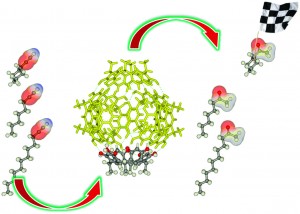Homogeneous catalytic systems which display selectivity in a mixture of similar substrates are rare. Now scientists in Italy and the Netherlands have shown that encapsulating a homogeneous catalyst in a supramolecular host can give it a more discerning nature.
Alessandro Scarso at the University of Venice and colleagues found that putting a catalyst within a supramolecular host makes it act more like an enzyme – only specific substrates can fit into the cavity and reach the catalyst. Supramolecular interactions between the substrate, host and catalyst provide additional levels of electronic restriction.
Read the full story at Chemistry World
Substrate Selectivity in the Alkyne Hydration Mediated by NHC-Au(I) controlled by Encapsulation of the Catalyst within a Hydrogen Bonded Hexameric Host
Alessandro Scarso, Alessandra Cavarzan, Francesco Trentin, Joost Reek and Giorgio Strukul
Catal. Sci. Technol., 2013, DOI: 10.1039/C3CY00300K, Communication











